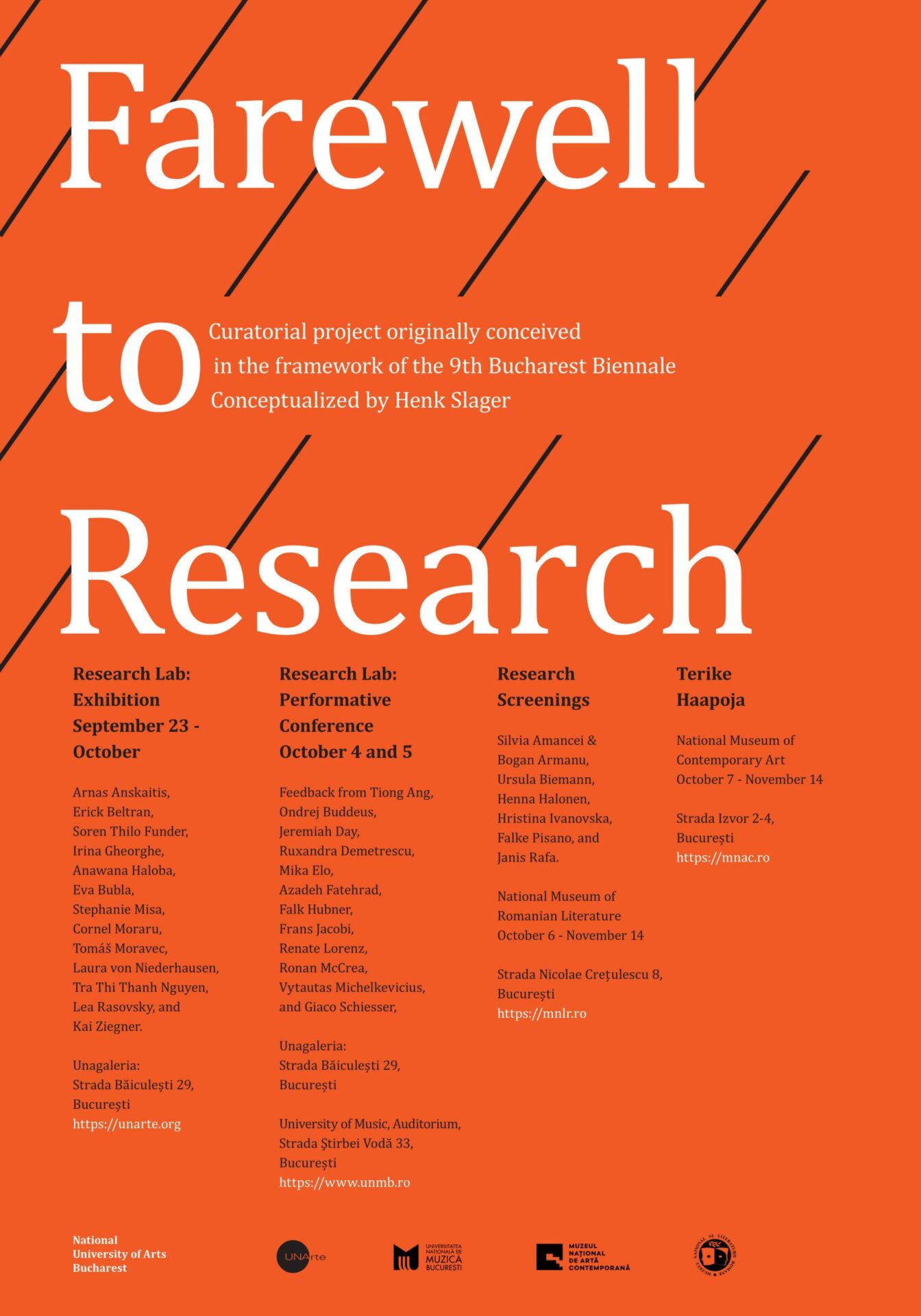
FAREWELL TO RESEARCH
27.09
2021
Participants: Arnas Anskaitis (Vilnius), Erick Beltran (Helsinki), Eva Bubla (Budapest), Søren Thilo Funder (Bergen), Irina Gheorghe (Dublin), Anawana Haloba (Bergen), Stephanie Misa (Helsinki), Cornel Moraru (Bucharest), Tomáš Moravec (Prague), Laura von Niederhausen (Zurich), Tra Thi Thanh Nguyen (Budapest), Lea Rasovsky (Bucharest), and Kai Ziegner (Zurich).
Unagaleria: Strada Băiculești 29, București
Similar to how Paul Feyerabend once questioned the dominance of rational knowledge in Farewell to Reason, this curatorial project will in turn question the dominant trend of academisized research that has reigned in art now for at least ten years. Today as well the danger lurks that “artistic research” will be encapsulated by academic routines and institutional stereotypes which will seriously impede creativity and artistic reflection. How do we prevent the fundamental dynamics and transformational potential – often described as processes without a protocol – of an as yet productive field from eventually becoming part of a hegemonic, controlling machine as a result of methodological processes of normalization. Could a “farewell” to such gentrified artistic research produce novel forms of articulation while proceeding from the perspective of contemporary art? Above all it needs to be emphasized that, in line with Feyerabend’s treatise, “farewell” should not be seen as a denial of importance, but particularly as showing the limitation of being increasingly institutionalized. To say farewell is not a departure, but a re-visit and a re-start.
The curatorial project “Farewell to Research” intends to provide a clear and constructive contribution to such re-thinking and re-evaluation. It departs from the assumption that the current ontological impasse – the continued repetition of the academic question “What is artistic research?” – could be overcome by formulating a proposition based on a recomposition of three conceptual spaces (creative practice, artistic thinking, curatorial strategies) that intersect when artistic research takes place.
By deploying such a point of view, “Farewell to Research” clearly takes a distance from a series of misconceptions that have accumulated around the concept of artistic research over the past decade. Through preformed, static categories, these misconceptions seem to reduce research in the arts to a noun, whereas the above-described dynamics and the related provisional quality rather ask for the dynamics of a verb. With such characterizations, the issue of the specificity of artistic knowledge production appears. Arnas Anskaitis addresses this issue by drawing attention to the structure of artistic arguments that he views as assemblages of semantics and noise: arguments that cannot be presented in written text, but in diagrams. Cornel Moraru underlines a similar way of presenting: artistic research as a practice of affective resonance, an intersection of the visual, technology, sound, and the performative. Erick Beltran also elucidates the role that transparancy has played in Western epistemology: according to him, it is up to artistic research to re-imagine truth as opaque and difficult to attain. Finally, Soren Thilo Funder emphasizes the importance of artistic research as a necessary reassessment of speculative knowledge: by means of alienating strategies (such as experimenting with contemporary horror fiction) he aims at extracting speculation from the dictate of absolute capitalism, that embraces algorithmic transactions and disregards environmental exhaustion.The issue of artistic research as another form of knowledge production could also be approached from a different perspective, i.e. how could such a form of artistic research contribute to the – critical – articulation of the urgencies we are confronted with today. Laura von Niederhausern, for example, argues that artistic thinking is able to generate space for a different sense of time: a form of thinking that, in contrast to the dominant chrononormativity, underscores contradictory time rhythms, asyncronicities, unpredictable timings and incommensurable temporalities. Such a different sense of time can also help us to fathom deeper layers of history, says Kai Ziegner. According to him, artistic research – while archiving, documenting – should stress, in a performative way, the historical moments of breakdown and the associated social changes.
In line with this, the question arises whether and how artistic research itself could contribute to social change. Tra Thi Thanh Nguyen claims that both the challenges of the current online world and the conditions of creativity will eventually lead to a mode of artistic research increasingly emphasizing its social position and role. A role that, as Eva Bubla outlines, is connected to catalyze processes. Precisely because of its interconnectedness, solidarity and sharing, artistic research is capable of making a difference.
Various strategies are available for such an artistic modification of thinking. In his proposition, Tomas Moravec analyzes and tests the strategy of material displacement: an aesthetic disconnection of object and location. Irina Gheorghe also performs an epistemological opportunity based on materiality: practices of deviation that contribute to the generation of other forms of knowledge because of a link between matter and the body. Such forms of knowledge could ultimately lead to the deconstruction, deconditioning, or decolonialization of established knowledge systems. Anawana Haloba accentuates that precisely artistic research should be committed to such causes: it is up to artistic research to put the needs and interests of the epistemologically disenfranchised at the forefront of knowledge production. Something that, as Stephanie Misa states, could lead to a performative strategy of discomfort: a discomfort that stems from being out-of-place, unheard, unseen, or bullied into submission – an indelible mark that has been carried far too long by those who the knowledge system has forgotten, or chosen to forget.
Note:
The curatorial project “Farewell to Research”, has actively collaborated over the past two years with leading platforms in the field of artistic research. Agreements were made with several institutions to develop experimental dissemination moments around the further articulation of our proposition (a research lab, a screening program, a performative conference – programs that had to be postponed and/or adjusted because of COVID-19). In this context, working visits were made to leading doctoral programs (Bergen, Bucharest, Budapest, Dublin, Helsinki, Prague, Vilnius, and Zurich). In consultation with the selective participants, a more performative presentation of a topical interpretation of artistic research was explored as a way of working.